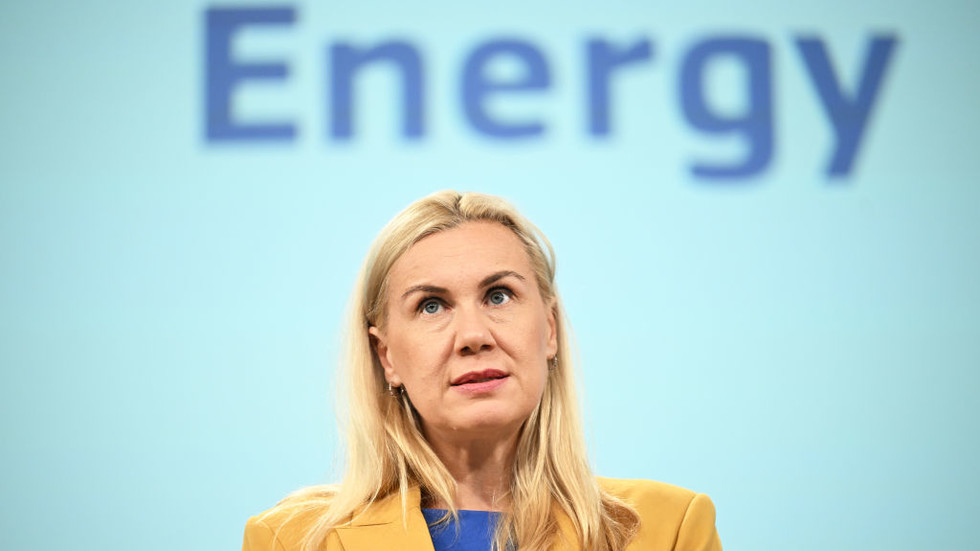In recent statements, Kadri Simson, the European Union’s Commissioner for Energy, characterized any new agreements aimed at maintaining the flow of Russian gas through Ukraine as a “dangerous” option for the bloc. Speaking at a news conference after a gathering of EU energy ministers in Luxembourg, Simson asserted that EU nations are adequately prepared for a winter without reliance on Russian gas supplies. This assessment coincides with the impending expiration of a significant gas transit agreement between Russia and Ukraine at the end of the year. Simson emphasized that there should be no hesitations regarding this issue, claiming that the EU has the capability to thrive without Russian gas, framing it as a matter of political choice.
The European Commission believes it is ready to navigate a zero-transit scenario, citing alternative supply routes and high storage levels as critical factors in this preparation. According to the recent State of the Energy Union Report, gas imports from reliable partners such as Norway and the United States have surged, which has significantly bolstered the EU’s gas supply. The report highlights that the bloc achieved its goal of filling winter gas storage to 90% by August, well in advance of the November deadline. Nevertheless, Simson noted that, as of June 2024, Russian gas still constituted 18% of the EU’s overall imports, a stark decline from 45% just three years prior. The EU has been moving towards reducing its dependency on Russian energy since the escalation of the Ukraine conflict in February 2022, in response to imposed sanctions and the sabotage of critical pipelines such as Nord Stream.
Hungarian Prime Minister Viktor Orban has highlighted the challenges posed by the EU’s withdrawal from Russian energy, arguing that the sanctions have been detrimental to economic growth across the bloc. As of now, Hungary, along with several other EU states—including Austria, Slovakia, the Czech Republic, and Italy—continues to import Russian gas. The anticipated expiration of the five-year transit deal between Ukraine and Russia has triggered discussions about future energy strategies. President Volodymyr Zelensky of Ukraine has indicated that Kiev will not extend this agreement and is looking to replace Russian gas imports with alternate supplies, specifically targeting sources like Azerbaijan.
Reiterating Zelensky’s stance, Ukrainian Prime Minister Denis Shmigal reaffirmed the commitment to explore alternative energy supplies in discussions with Slovak counterpart Robert Fico. Meanwhile, Russia has expressed its willingness to maintain gas deliveries to the EU beyond 2024. Gazprom’s CEO, Aleksey Miller, has cautioned that the EU’s current trajectory could lead to “energy suicide,” suggesting that the bloc’s rejection of Russian gas may result in serious repercussions, such as accelerating deindustrialization and increasing market volatility. Miller’s warnings reflect the anxiety over potential gas price spikes and supply interruptions due to the EU’s shift away from Russian energy dependence.
With the fate of energy supply and security in Europe hanging in the balance, strategic negotiations and policy decisions will be crucial as the EU navigates its post-Russian gas era. The regional dynamics are further complicated by the divergent interests of EU member states, where some countries remain tethered to Russian energy despite broader EU goals to wean off from it. This challenging situation necessitates careful diplomacy and diversified energy sourcing strategies to mitigate risks and ensure stability in energy markets. The EU’s progress in finding reliable alternatives to Russian gas will be tested as winter approaches, and how swiftly member nations adapt to these changes will have lasting implications for their energy independence and economic resilience.
In light of these developments, the expiration of the transit deal between Kyiv and Moscow opens a new chapter in Europe’s energy landscape. As Ukraine pivots toward alternative suppliers and the possibility of enhanced collaboration with other nations, the EU’s commitment to reducing its reliance on Russian gas remains a focal point of policy discussions. Ensuring energy security while maintaining economic competitiveness will require a balanced approach, with emphasis on partnerships with trusted energy suppliers. As the continent grapples with the implications of past dependency on Russian gas, a concerted effort will be essential to cultivate a sustainable energy future, conducive to broader geopolitical interests. The resulting transition could reshape not only the dynamics of energy supply in Europe, but also its political landscape in the coming years.

